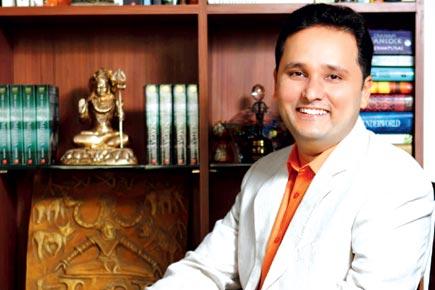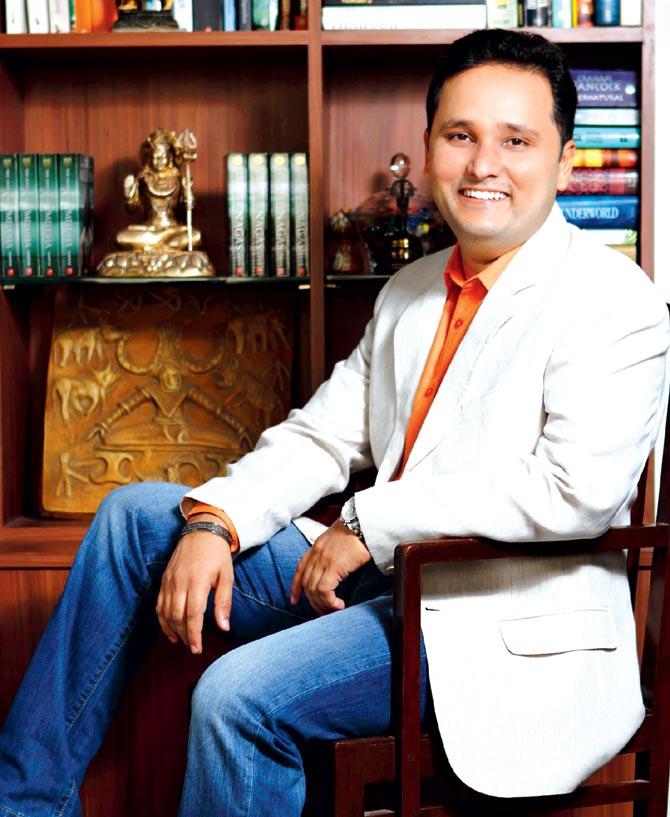Author Amish Tripathi, whose first book of Ram Chandra series - Scion of Ikshvaku - launches tomorrow, talks to Phorum Dalal about his interpretation of the Ramayana, what we can learn from Lord Ram, his reading habits and the Indianness of the present generation

Amish Tripathi
It's pouring cats and dogs on the day we call author Amish Tripathi, who is surprised we have not taken the day off. Pleasantries done, we shoot a volley of questions at him about the first book of his Ram Chandra series, Scion of Ikshvaku, which launches tomorrow.
Amish Tripathi
ADVERTISEMENT
When he is not writing, Tripathi is reading, confessing his house in Mahim is filled with books. "Thankfully, all the books I buy are tax deductible as they are part of my 'research'," he quips. Excerpts from the interview:
Q. After the Shiva trilogy, did you always plan to write the Ram Chandra series?
A. Every book series I will write over the next 25 years are all inter-linked to the Shiva trilogy. They will tell the story of the Vedic people of our age, over a 9000 year period — how their culture was created, to when their culture was destroyed 3,500 years ago. And we are their unworthy descendants. The Ram Chandra series tells the stories of people who lived 1,500 years before the events of the Shiva trilogy took place. I have left clues for all the future series in the Shiva trilogy. Be it the Mahabharata, stories about Lord Parshurama, Lord Manu, Lord Brahma, I have the entire thing mapped in my mind.
Q. Tell us about your version of the Ramayana. What do you want to convey?
A. There are many things I want to communicate about Lord Ram through my book. One, that it is cool to follow rules. Indians have a very complex relationship with rules — we love pointing fingers at politicians and bureaucrats. But how often do we follow the rules ourselves? Do we know what we want to do with rules, or are they just a tool to attack people we don't like? Secondly, can we build a better society if we follow the rules. It is not easy to follow rules all the time. Or should we choose freedom over rules?
But overall, the book is an adventure-thriller.
Q. Did you refer to a particular version of the ancient text?
A. The book is my respectful version of the Ramayana, which has so many versions. The most popular one in Maharashtra and up north, is the Rama Charitra Manas, which was the source material for the popular television serial in the '80s. This version is the 16th century modernised account of Valmiki's Ramayana. Much of my knowledge of mythology comes from my family, as my grandfather was a pandit. I have studied many versions in detail such as the original Valmiki Ramayana, Kamba Ramayanam and Adbhuta Ramayana. I have heard stories of tribal and Jain versions of the Ramayana too.
Q. How do you think the reader has changed over the years?
A. I can't say I understand my readers completely, no author can claim that. I just write what comes to me naturally. However, I do believe that the new generation is more Indian than my generation or the generation of my parents. They follow the traditional Indian way of questioning, and do not take anything at face value.
Q. Tell us about the kind of books you read?
A. I read four to eight books every month, and have read at that pace for decades. Most of it is non-fiction, and about 10 to 15 per cent is fiction. Recently, I read two of Dr Ambedkar's books: Pakistan, or, The Partition of India and Who Were the Shudras. I really enjoyed Sam Harris's Waking Up. Currently, I am reading the English translation of the Malayalam book Bhima by MT Vasudevan Nair.
Q. What is your writing discipline?
A. I wake up at 5.30 am every day. After my exercise and puja, I read four newspapers and sit to write. I usually go with the flow — sometimes, I write for straight eight hours, and the day words don't flow, assuming Lord Shiva is busy with someone else, I take a break, go watch a movie perhaps or read. There are two things I need when I write. Firstly, music, which ranges from Hindustani classical, Western classical, Bollywood to pop music and rock to match the mood of what I am writing. Secondly, cream biscuits. So, I tend to put on weight when I am in the middle of the writing process. But once I have finished a book, I make sure I get back into shape.
 Subscribe today by clicking the link and stay updated with the latest news!" Click here!
Subscribe today by clicking the link and stay updated with the latest news!" Click here!






